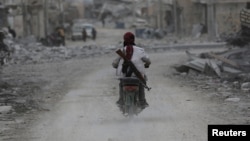Nearly one week after Islamic State fighters were driven from the strategic town of al-Bab, northern Syria is in military disarray with U.S.-supported factions fighting each other and thousands of residents fleeing to havens to avoid the chaos.
Control of areas changes within a few kilometers and skirmishes break out amid an uneasy detente.
Turkish forces and their rebel allies drove Islamic State (IS) from al-Bab last week. Now Syrian forces, with the help of Russian airpower, are battling IS in nearby villages. Syrian forces too have fought with Turkish-backed personnel to keep them from expanding beyond al-Bab.
Near miss for U.S. troops
The situation is similarly complicated on al-Bab's eastern front, where Turkish-backed rebels are battling U.S.-backed Syrian Democratic Forces (SDF), a Kurdish-led coalition force.
“Al-Bab is the symbol of what will be the new normal — larger powers fighting over the pieces of the carcass of IS's would-be caliphate,” said analyst Nicholas Heras, a Middle East researcher at the Center for a New American Security, a Washington-based research organization.
In an apparent mix-up, Russian and Syrian aircraft this week mistakenly bombed members of the U.S.-backed SDF outside al-Bab, with U.S. troops just a few kilometers away, a top U.S. general in Iraq said.
Al-Bab is a wasteland
While al-Bab is currently under the control of the Turkish military and their allies in the Euphrates Shield operation, the city has turned into a wasteland due to fierce fighting there that lasted for months, analysts say.
Turkish-allied “forces are set to be there for the long haul, especially because control over al-Bab provides the Turkish military with a key forward operating base east of Aleppo,” said analyst Heras.
The significant advances made by Syrian government troops in the town of Tadef near al-Bab, with IS fighters retreating toward their de facto capital of Raqqa, could potentially increase tensions between Syrian forces and the Turkish military.
IS “withdrew from Tadef to avoid an inevitable loss there,” said Zara Seyda, a Syrian journalist who reports on the fighting in the al-Bab area. “This will put regime forces in a direct face-off with Turkish-backed rebels.”
Turks want SDF to leave Manbij
Syrian President Bashar al-Assad's forces realize that any further Turkish expansion in this part of northern Syria would make their task to recapture territory even harder, analysts say.
Turkish occupation “is an existential threat to the Assad government's ability to reclaim the entirety of its territory, which is a key argument that regime loyalists make in their support of Bashar al-Assad's government,” Heras said.
Turkish officials say they want to oust the SDF from the nearby town of Manbij. Turkey views the Kurdish YPG, the main group within the SDF, as a terrorist organization. Both the Turkish incursion into al-Bab and the SDF fight against IS have U.S. support.
Turkey's role unclear
Turkish and U.S. officials have been discussing in recent weeks the role of Turkish forces in northern Syria. Top Turkish officials are increasing pressure on the Trump administration to dissolve the American military partnership with Syrian Kurds in the battle against IS.
Turkish Foreign Minister Mevlut Cavusoglu told reporters this week that Turkish troops will continue assaulting Kurdish fighters in areas around Manbij.
“We do not want any of our allies to stand with terrorist groups. We stated earlier that Turkey will hit the YPG unless they withdraw from Manbij,” he said.
The Manbij Military Council, part of the SDF, announced Thursday that it has agreed to withdraw from villages west of Manbij but not because of Turkish pressure.
Russia brokers deal
The deal, reportedly brokered by Russia, allows SDF forces to withdraw from the villages and “hand them over to Syrian state forces which will protect them from the Turkish military,” a statement from the council said.
The withdrawal of Kurdish fighters from west Manbij “sends a signal to Turkey that the SDF understands the strategic value of the territory to Euphrates Shield, and will spite Turkey by giving it to Assad,” analyst Heras said.
Despite Turkish concerns, U.S. military officials have expressed support of Syrian Kurdish fighters, especially in the fight to dislodge IS from its de facto capital of Raqqa the next target of varied forces against the jihadist group.
Lieutenant General Stephen Townsend, the top U.S. commander in Iraq, said Wednesday, “There are going to be Kurds assaulting Raqqa for sure. The number, the size of them, and how many Kurdish units are participating in that, I can't really say right now."
VOA's Kasim Cindemir contributed to this report.






